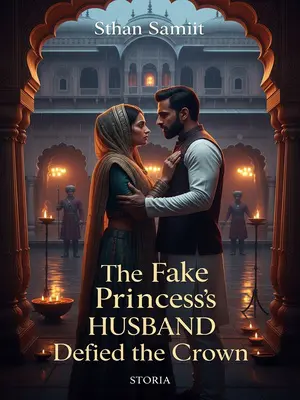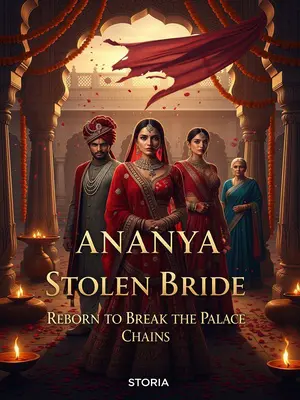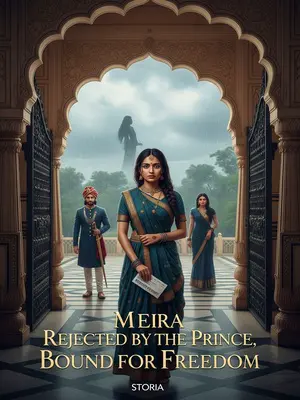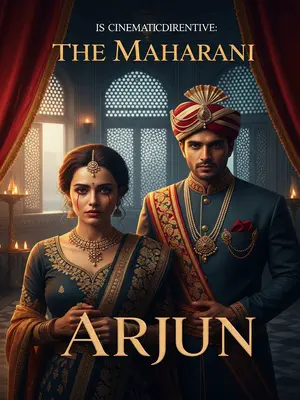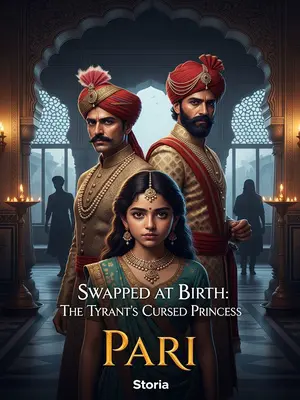Chapter 5: The Reluctant Groom
I passed my coming-of-age year without incident; my two brothers both engaged, and only I am left.
The palace, usually buzzing with wedding plans, barely noticed my adulthood—except for the old ayah, who fussed as if I were still a child.
The old ayah in Maa Sa’s palace hinted several times, wanting her to ask the Maharaja to arrange a marriage for me.
She’d mutter while oiling my hair, “Arjun Baba, you’re of age now. Ask your mother to speak with the Maharaja, or the right girls will all be gone!”
But Maa Sa still eats and drinks as usual, shakes her head and doesn’t care, living by the principle that blessings are determined by God—no need to worry, fate will come on its own.
She’d spoon extra ghee onto her parathas, smile at the ayah, and say, “Let the mango fall when it’s ripe, not before.”
With no worries, she’s getting rounder by the day.
Her sarees no longer fit as they used to, and even the palace tailor has started adding extra fabric to her blouses.
I quite agree with Maa Sa’s view.
Why rush? I’m happy enough watching the sun set over the palace walls and listening to the temple bells in the distance.
The old ayah is too anxious. The Maharaja’s son—could he really stay single?
She’s convinced if I don’t marry soon, the palace will blame her. I suspect she’s more worried about losing her job than my happiness.
Sure enough, one day in the palace gardens, I ran into the Maharani, who saw I’d grown up and offered to find me a suitable bride.
She was feeding grain to the peacocks when she spotted me. “Arjun, you’re all grown up! Leave the matter of your marriage to me.” I could see the gleam in her eye—a new project to control.
With the Maharani getting involved, Rani Meera was alarmed too, and the two families started bickering, neither willing to back down.
Soon, the entire harem was abuzz—servants scurrying back and forth, Ranis arguing so loudly, even the peacocks stopped their dance and stared from the terrace. It was as if I were a gold bar to be auctioned off.
They both pestered Father Maharaja, each wanting to marry their own cousin to me.
Father Maharaja looked more tired than usual, rubbing his forehead as both queens presented long lists of eligible girls, each with their own strengths and dowries.
Kunal Sharma spoke up for me:
He couldn’t resist adding his own logic, much to everyone’s amusement and some discomfort among the queens.
“The eldest prince marries the only daughter of Raja Devendra, with a dowry of a hundred thousand acres. The second prince marries the legitimate daughter of Diwan Singh, a pillar of the upright officials.”
He listed their family trees and dowries as if auctioning cows at the village fair.
“You may not be as prominent as the eldest, nor as noble as the legitimate son, but you’re still the third prince. Whether marrying a Raja’s daughter or a noble lady, it’s more than enough.”
I could sense Kunal’s attempt to hype me up, but even he knew the odds.
“How could you settle for distant relatives from small families?”
His tone was half-serious, half-teasing, but the Ranis didn’t like his interference.
I couldn’t help but laugh.
The whole scene was so comical—everyone fighting over me as if I were a golden mango in the palace orchard.
With all this matchmaking, why do I feel like a prized breeding bull?
Kunal rolled his eyes at my comment but couldn’t disagree.
Kunal Sharma is different from me.
He’s always chased after perfection, as if his destiny depended on it. I think he secretly wants his life to be a story in the next Amar Chitra Katha.
He doesn’t know—having a wife is better than none.
I would be happy with someone who knows how to make good pakoras and doesn’t mind my laziness. Kunal, however, wants a partner who can debate philosophy and run the marathon too.
Not everyone is like him: young, proud, the most dazzling lord in the capital, the dream of every maiden.
Even the palace maids giggle behind his back, and every wedding invitation that arrives for his family carries a hopeful air.
When his family chose a wife, they screened the whole kingdom inside and out.
The Sharma family set up lists, called astrologers, and even had secret interviews with the eligible girls. The process was more intense than the IAS exams.
The requirements included: good family, spotless reputation, upright ancestors, kind parents, helpful brothers, outstanding talent…
And of course, a perfect horoscope match and a singing voice fit for temple bhajans!
After three or four years, they finally settled on the young princess from Raja Anil’s household.
It was a grand affair—elephants, horses, and dhol beats echoing down the main road. The whole city came to watch.
I may be a prince, but I’m nowhere near his league when it comes to marriage.
My own engagement would probably merit a small notice in the back of the palace gazette.
So I turned to comfort him:
I patted his back in mock sympathy, “Don’t worry, yaar, not everyone is born to be the star of the show.”
“Even you know I’m not prominent or noble enough, so how could others not know?”
It’s the plain truth—nobody bets on a horse that doesn’t run in the race.
“Noble families always want to hitch their wagons to the rising star; who would bet their treasures on a prince like me, already out of the running?”
I shrugged, hoping he’d see reason, but Kunal only looked more frustrated.
“Besides, I have the ‘good name’ of being slow-witted, not at all the white knight in shining armour. I doubt the girls in their rooms are eager either.”
If they’ve heard even half the palace gossip, they probably pray their mothers don’t mention my name at all.
Kunal Sharma glared at me, his eyes full of three parts sympathy, three parts pity, three parts anger, and one part helplessness.
His expressions change faster than the weather in Delhi. I almost wanted to laugh, but thought better of it.
In the end, he concluded:
“Don’t worry! The Maharaja will never agree.”
He flung his hands in the air, as if blessing me with the gift of bachelorhood.



